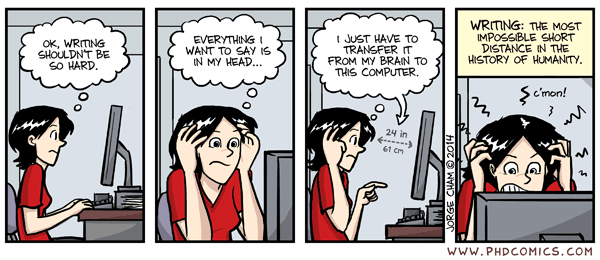George Orwell’s six rules for writing
- Never use a metaphor, simile, or other figure of speech which you are used to seeing in print.
- Never use a long word where a short one will do.
- If it is possible to cut a word out, always cut it out.
- Never use the passive where you can use the active.
- Never use a foreign phrase, a scientific word, or a jargon word if you can think of an everyday English equivalent.
- Break any of these rules sooner than say anything outright barbarous.
###

Jorge Cham, PhD Comics http://www.phdcomics.com/comics.php?f=1732
###
The internet is full of helpful writing advice:
- 50 writing errors that make you look like an amateur
- On uses of “alot”
- 10 words you need to stop misspelling
- The Oatmeal full collection of grammar comics
- Grammar Girl!
###
Proofreading and editing is what makes a paper from a mediocre one to an excellent one. Most writers are not enthusiastic about proofreading their own work and editing it extensively – good writers know its worth the effort.
These tips on editing & proofreading come from the Writing Center at Gustavus Adolphus College.
Editing
Editing is the process writers use to catch errors typical to their own writing. Because editing focuses on problems that are particular to an individual writer and that occur again and again effective editing requires that you know the types of errors you typically make and that you have specific strategies for finding those errors.
- Read the paper aloud as if you are reading a story. Listen for errors. If you listen carefully, you will be able to correct any errors that you hear. Listen for incomplete phrases, sentences and ideas, as well as things that sound funny.
- Stop and change anything you wish as soon as you see it punctuation, spelling, and sentence structure. Move through the paper at a reasonable rate.
- Read the entire paper. Listen for spots that arent readable, that feel or sound awkward, or that dont seem clear. Mark these spots. Then, when youre done reading the whole paper, go back to fix them.
- Allow yourself some time between writing your paper and editing. Ideally, wait a day; this allows the writing to get cold, giving you an opportunity to “see” the errors. If you cant wait a day, go away and do something else for a while work for another class, cleaning, eating so that you can return to your work with a fresh mind and fresh eyes.
- Read one sentence at a time.
- Using a sheet of clean paper, cover all the text except the first sentence. Read this sentence carefully. Does it sound and look correct? Does it say what you want it to say? Continue down the page in the same way.
- Look for patterns of error.
- Personal patterns: All writers make mistakes that are typical of their writing. If you always forget commas, check for commas. If you always have trouble with transitions, look for transitions. If you work on wordiness, look for this. Bring your essays to the writing center! A tutor can help you to locate the patterns of error.
- List: Keep a list of your trouble spots. Use this as a checklist and refer to it as you edit.
4. Know your grammar and punctuation rules or know where to look them up.
· Study the rules of grammar and punctuation. Review the ones you dont know. If you have a writing handbook or handouts, keep them out when you write. Refer to them when you have questions as you write and edit.
Proofreading
Proofreading, the final stage, focuses on random goofs. The final draft has been corrected, but sometimes, because of computer error, fatigue, carelessness, or oversight, mistakes are still present. It is important to go through the paper one last time to catch these random goofs.
- Read the paper as a reader.
- Read and enjoy your work. Sit back, and read the paper as if you were the teacher. What do you notice?
- Read one sentence/paragraph at a time.
· Take a clean sheet of paper, and place it under the first sentence of your paper. Read this sentence carefully. Do you see any mistakes, typos, or careless omissions?
- Read backwards.
· Start at the bottom of the page on the right side. Look at the words from right to left, check for spelling/typographical errors.